Voices and Viewpoints Part I: Getting Set for an Oral History Session
I had been an oral history consultant for a decade before I discovered how important my work could be. It happened one the day in 2005 when I visited the home of labor lawyer Eugene Keating. He was in bed, weak with cancer and days away from the end, but Keating wanted to get his story on record. We did.
Ultimately history is about people, and historians have a duty to men and women like Keating who take their life’s work seriously and understand its historical importance. Oral history is the way that we fulfill it.
There are interviewers whose method is to start the recorder, let the interviewee talk, and sort it all out later. That is not my approach. True, the session should be all about the interviewee, but I’ve always believed that was up to me to do the work necessary, before, during, and after, to ensure that the results did justice to a morning or afternoon’s interview and a full life’s work.
To honor the commitment of people like Eugene Keating is one reason to hire a professional oral history consultant. There is a second, equally important reason. Some assume that only a lawyer can really interview a lawyer, a scientist a scientist, and so on. It does not work that way. Whenever fellow specialists or veterans of the same organization or get together, they tend to talk in shorthand. Inside baseball obscures more than it reveals. It is difficult for an insider to carry out the kind of discovery that makes for good oral history. Most importantly, oral history is an art, a craft, and a profession—you want someone who has done it before.
What Is Oral History?
Everyone is familiar with interviews. Journalists use them to source their stories, television news magazines present them with ponderousness or sensationalism, and web outlets run lively edited versions. Interviews are good for finding out facts. They usually focus on a particular event or issue and attempt to extract knowledge that will benefit a particular audience in the short term. In some respects, interviews are dispensable.
Oral histories, on the other hand, are intended to cast a wide net, to capture a life’s work, and they are meant to last. They establish context by starting with personal background, education, and early experience. They provide perspective by allowing interviewees to talk broadly about their careers—who they worked with, how circumstances changed, and what they accomplished. Finally, a well-conducted oral history should be relevant to more than just the project at hand. While every session must have focus, no interviewer knows exactly what will be of interest a generation from now. Good oral history consultants realize that they have an opportunity that will be unavailable years on, and that they owe it to future audiences to preserve information that will be relevant not only today but tomorrow.
Selecting the Interviewees
Whom to interview? It depends. I have gone into some projects with a special focus in mind such as interviewing the women commissioners of the Securities and Exchange Commission. The majority of my oral history projects are for a company history book or intended to capture the history of an institution like a university or an association. In those cases what I am looking for is perspective. Senior management, both current and former, inevitably make the list because they, more than others, spent their time thinking broadly about the organization, knew what it was up against, and made decisions that changed its history. But if the book is to be a sizeable one there are also specialists who should be on the record, in finance, sales and marketing, even personnel. People in those positions will have perspective and will know details that no one else can provide. The same goes for employees. When I was working on Never Stand Still, a full-scale history of trucking company Consolidated Freightways, some of my most memorable interviews were with drivers. The real finds, of course, are the people who have “worked their way up:” an employee who became CEO, a student who became college administrator—those are the kinds of interviewees who give you the most direct gateway to the history you intend to capture or to write.
Researching the Interview Agenda
Few things are as important to the success of an interview as preparation. Interviewees will quickly discover whether an oral history consultant knows what he or she is talking about. If they do, interviewees will be grateful for the effort and all the more willing to participate constructively.
There are three levels of preparation. First you have to develop the context for the interviewee’s life, particularly the industries or institutions within which they have worked. Since many of my oral histories are undertaken to support a book project, that part of the job is often taken care of. If not, I usually build a research phase into the project so that I will have the time required to put together the big picture.
Next comes research regarding the interviewee. This may require one of two different approaches. For public figures or industry leaders there will be a great deal of material available in trade journals and newspapers. These people may well have been interviewed before. In such cases the task is to keep the research project manageable—to keep from getting bogged down in the details and to think about how your interview can complement and extend existing accounts. For those who left little public record the approach must be different. You may begin with their resume (or by building one with assistance from the client or even the interviewee). You can then compare the roles they have played in the institution with the history that you know, figuring out which parts of a company or institution’s history they may have been most directly involved in. That process helps you determine what kinds of things you would like to talk about.
And “talking” is important. A good interview is not a question and answer session. It is a conversation in which the interviewer says little. With that in mind, when I am preparing, I try to avoid drafting specific questions. Instead I prepare an agenda, essentially an outline of how I would like the conversation to go, with broad topics divided roughly into chronological segments: childhood and education, early experience, and landmarks in the later career.
Oral History Technology
One last important point about preparation—you must know how to use your equipment. I have seen interviews spoiled because they were recorded with bad equipment, at the wrong volume level, or with bad microphone placement. I once had a tape recorder fail me in the middle of an interview. I was fortunate that the interviewee was retired, with plenty of free time, and that he was also a gracious person. I excused myself, hurried to the store to buy a new recorder, and for years afterwards I always brought, and used, two machines. Fortunately, I had realized that the recorder stopped working.
The recorder that failed me used cassettes. The one I hurriedly purchased was digital. Now everything is digital, and clients often expect high quality audio. They increasingly expect video as well. You do not have to be a sound engineer to record high quality digital audio, even with multiple mike setups. But I leave the videography up to professionals and am always ready with a recommendation.
The final matter of preparation is scheduling the interview. In almost every case, I leave it to the client to tell the interviewees about the project and to let them know that someone will be coming to talk about their career. Then I follow up with a phone call or email to schedule the session. In some cases the client also asks that I run the outline by the interviewee.
I try to keep this process as simple as possible for two reasons. First, there are those, even the highly accomplished, who will be intimidated by the prospect of an interview. Some wish to postpone the session for weeks or even months so they can do research. I explain that I can get most names and dates from my research, that what I am really after are the things that they will remember—the highlights, not the minutiae, of their careers. Some people wish to rehearse the interview over the phone. I try to discourage that because it takes the spontaneity out of the actual interview, making it less a lively conversation than a dull performance.
When it comes to venue, I am usually amenable to any place that is quiet and comfortable for the interviewee. A secluded room in the house (no grandfather clocks) is good for a retiree. For a working executive that may be an office or a conference room. Some interviewees will want to talk in a public place like a restaurant or a club. I have complied in a few cases but have usually been sorry. There are always distractions and background noise. Nearly every public place has music playing in the background that you cannot escape.
Being Prepared for Special Requests
Most of my book clients just assume that I will be doing interviews of some sort. As part of book projects, audio interviews are almost always appropriate, mostly in person and sometimes by telephone. Although an in-person session usually makes for better rapport and better interviews, I would be hard pressed to come up with an example from the scores of telephone interviews that I have conducted that did not succeed due to the distance.
Early in my career, audio was the standard for more formal oral history interview projects. Lately video has become the standard medium, and while I always use professionals to capture the video, there are important adjustments I have learned to make during a video session.
Interviewers instinctively use verbal cues to let the interviewee know that he is interested and understand. No one notices these until they try to edit out clean excerpts. When you are interviewing for broadcast quality audio or video it is important to leave a clean signal. Do not say “uh-huh” over the interviewee to show that you understand—nod your head instead. And always wait until the interviewee is completely done talking before you say anything.
Then there is the question of how many people to invite to the party. There is a reason that cameramen wear black—so they stay in the background and interviewees forget about them. At times a client or interviewee will ask that others be present. This is never a good idea. Sometimes the interviewee plays to the crowd. Sometimes the other party—a well-meaning spouse at the kitchen table, for example—insists on repeatedly interrupting to “clarify” things. I have tried many direct and indirect ways to politely keep observers from interfering. I well remember one instance when the subject, appropriately, stopped the interview and asked his overly helpful wife to leave us alone until the session was over.
Finally, I have had a surprising number of clients come up with the same great idea—have interviewees gather in a circle and bounce old stories off one another. I have been obliged to take part in this a handful of times and it has never worked. There are arguments about what really happened that cannot be resolved. Old associates inevitably lapse into inside baseball that obscures more than enlightens and invariably some people defer while others dominate. In recognition of the importance of every interviewee, I always recommend keeping things one on one.
Next time: How an oral history consultant should conduct the session, what to expect afterward, and how you can use the results of the work.
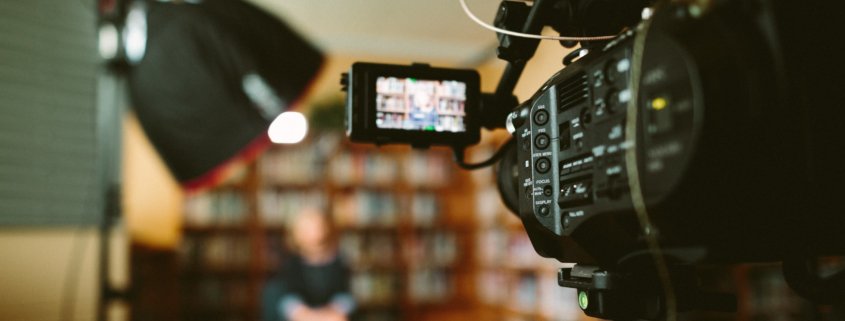
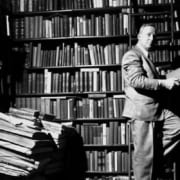
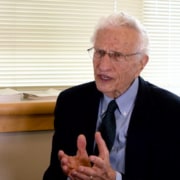
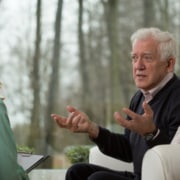
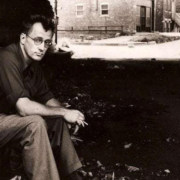


Trackbacks & Pingbacks
[…] will need to partner more closely when it comes to arranging the interviews. After we have come up with an interview list, I rely on the client to make the initial […]
Comments are closed.